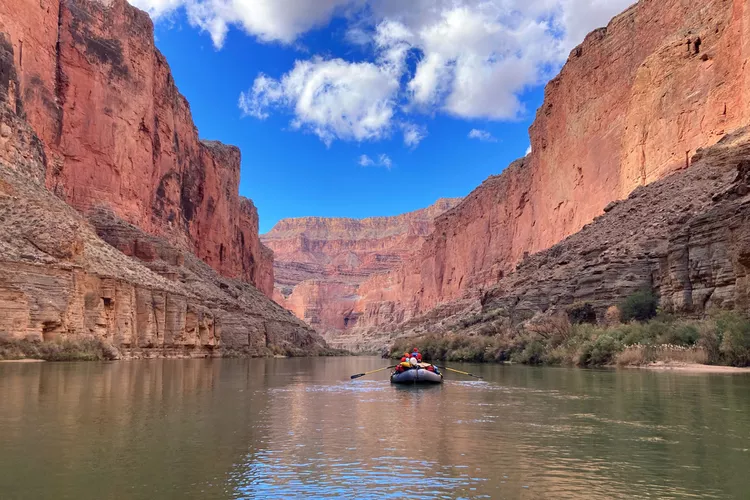Summary
Go rafting in the Grand Canyon this winter for a national park adventure without the crowds.
Fact checked by Elizabeth MacLennan
1. Grand Canyon Rafting Adventure
As millions of people flock to the Grand Canyon to enjoy the expansive views and picture-worthy day hikes, it’s easy to wonder how a place so vast can feel so crowded. It’s unsurprising that one of the seven natural wonders of the world attracts visitors from all over the globe, yet few experience its most exclusive adventure: exploring the national park by raft.
2. Details of the Rafting Journey
This thrilling adventure spans almost 300 miles from Lees Ferry to Diamond Creek and can take up to 25 days to complete based on the group’s pace. Some days on the river are spent floating down calm stretches, admiring the colorful rocks and textured formations, while others are filled with adrenaline as you navigate exhilarating whitewater rapids.
3. Exploring the Colorado River Shores
The shores of the Colorado River offer even more to explore. Trails lead to dramatic narrows, peaceful grottos, and rushing waterfalls, all of which are often inaccessible without a boat. This river also provides access to thousands of archaeological sites that tell the story of Indigenous inhabitants, including the ancestral Puebloan granaries located at Nankoweap, historically used to store grain and seeds.
:max_bytes(150000):strip_icc():format(webp)/grand-canyon-nankoweap-granaries-WINTERRAFT0122-243359374c1640829007588a21d485e2.jpg)
4. Permit Process for Non-Commercial Trips
Permits for these non-commercial trips have been highly sought after for decades. In 2006, the National Park Service (NPS) overhauled its existing waitlist system, which was reportedly backed up for 25 years. Now, visitors can enter an annual lottery process, allowing a chance of securing one of roughly 250 openings each year.
Every February, thousands submit their names, hoping that this will be the year they are randomly selected. While no guarantees exist for receiving a permit, applying for less popular dates, particularly in winter, often increases the odds of successfully securing a spot.
5. Winter Rafting Experience
Winter visits not only tend to be more manageable to secure but also provide an unparalleled connection to the canyon, as commercial trips and motorized vessels are prohibited. Consequently, this leads to tranquil days and significantly fewer people on the river.
:max_bytes(150000):strip_icc():format(webp)/grand-canyon-river-winter-landscape-WINTERRAFT0122-da89c33b37214965bf58e630867fae14.jpg)
However, winter rafting does come with challenges, including overnight temperatures that often plunge below freezing, and snow is not uncommon. In early winter, with limited daylight hours coupled with the high canyon walls, direct sunshine is available for only a few hours each day.
6. Essential Gear for Winter Rafting
To stay warm during the day, adventurers dress as if preparing for a ski trip, layering long underwear under fleeces and puffy jackets. The key top layer, however, is specific to river rafting—a dry suit made of nylon designed to keep everything beneath perfectly dry.
:max_bytes(150000):strip_icc():format(webp)/grand-canyon-river-raft-sunset-WINTERRAFT0122-83e02214818a436b82c406cd08c2cc88.jpg)
The $1,000 dry suit is just one piece of essential equipment for winter rafting. Additionally, a cold-weather gear list should also include extra layers for warmth and some unexpected items that enhance comfort in the chilly conditions.
While summer skincare focuses on preventing sunburns, in winter, dry hands become a boater’s worst enemy. Over just a few days on the river, skin can crack; therefore, it is advisable for boaters to generously apply moisturizer. Moreover, ice fishing boots are a favored choice for keeping feet both dry and warm while loading and unloading boats at the shore nightly.
7. Is It Worth It?
So, is it worth enduring the winter conditions? Many might prefer to stay with the crowds at the rim or opt for a commercial whitewater rafting trip in the summer. However, for those who seize the opportunity to spend weeks at the base of the Grand Canyon with few to no other visitors, the unique adventure stands out as a worthy trade-off for the frosty mornings.




